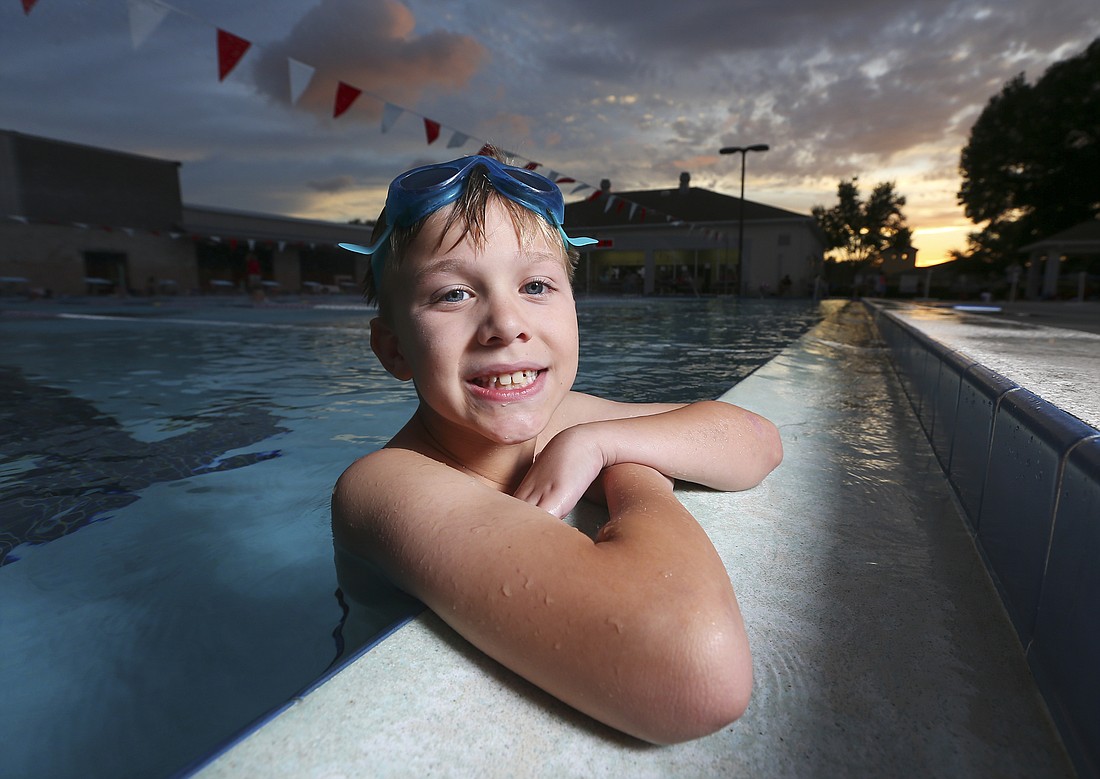- January 9, 2025
-
-
Loading

Loading

Christina Marinelli never tires of watching her 8-year-old son, Anthony Marinelli, as he swims in the pool.
At SouthWest Aquatics in Winter Garden, he is just like any other kid — splashing about in the water and learning proper swimming technique.
Although if you ask him, swimming is more than just perfecting a freestyle stroke in hopes of becoming the next Michael Phelps.
“(It’s) the enjoyment of moving around and making brand-new friends that I didn’t know,” Anthony said.
While making friends and swimming may be simple to other kids, for Anthony — diagnosed with autism, Tourette syndrome, ADHD and anxiety — it had been a struggle since he was young, Christina said.
Regardless, Anthony never gave up. And now, two years into the SouthWest swim program, he tested out in the last few weeks to join the competitive swim team.
“It really means the world to me,” Christina said. “I’ve been there every step of the way — (through) different therapies and working through different skill sets that come so easily to other kids. Seeing him be able to push through… I’m beyond excited that he has overcome those things.”
To understand how remarkable Anthony’s journey has been, one has to go back a few years.
At just 5 months old, Anthony was placed into physical therapy for torticollis — a rare condition in which the neck muscles contract, causing the head to twist to one side (in Anthony’s case, his head twists to the right slightly).
The condition led to weakness on the right side of his body — including his arms, legs and core. His torticollis was a physical tic caused by Tourette syndrome.
At age 4, Anthony was diagnosed with autism. The news was tough to hear — but not a total surprise to Christina.
“I realized that he was a little bit different when he was 2 years old and could carry on full-blown conversations with an adult about adult-type things,” Christina said. “He stayed home with my mom until he was two-and-a-half, and at that point, we decided he needed to be socialized a little bit.
“We thought that because he had spent so much time around adults that he was just a little adult because of his environment,” she said. “But even when he started daycare at two-and-a-half — trying to communicate and learn and play with other kids — he still really never caught on to those things.”
What followed was a childhood filled with many therapies to help Anthony — including seeing physical, occupational, speech, vision and behavioral specialists — and it never seemed to bother him, Christina said.
For Anthony, it was time to have one-on-one conversations with adults whose focus was completely on him.
“He started to notice he was different from other kids and he was asking questions, and he kind of wanted to know why he was different,” Christina said. “He’s known very early on — right after his diagnosis — that he has this thing called autism, and it kind of gives you super powers.”
Two years ago, Christina decided to enroll Anthony into swim classes at SouthWest Aquatics and hoped it would help him both physically and socially.
She wanted him to participate in something in which he didn’t have to worry about others relying on him — while working on his own techniques.
“Being ADHD and on the autism spectrum disorder, we know that swimming is typically a good activity for individuals with those diagnoses, because they only have to depend on themselves and their skill sets,” Christina said.
The lessons proved to be a challenge for Anthony, whose physical tics and cross-body weakness can inhibit progress. Things that would normally take younger swimmers only a short time to figure out — such as the breaststroke — took even longer for Anthony.
“You’re supposed to have two flat feet, but whenever I do the breaststroke kick, one of my feet goes straight and my other goes flat,” Anthony said. “It’s hard for me to correct them, and when I correct them, it hurts.”
The torticollis also affects the young swimmer both in and out of the pool.
Because of the tilt of his head, growing up, Anthony’s eyes began to work independently of one another, which threw off balance and depth perception.
Despite the physical and mental setbacks, Anthony has continuously moved through each level at SouthWest. He started with 15-minute sessions two times a week and now completes hourlong sessions three times a week as a member of the competitive swim team.
“(I’m excited for) all the meets and actually winning medals — not participation medals,” Anthony said.
Although Anthony is more than ready to take to the pool and swim away with some new hardware, Christina is just happy he has found something of his own that has helped him grow and develop.
“I’m excited for him to work on developing relationships with the other swimmers, because they do spend quite a bit of time together,” Christina said. “I’m hoping he kind of learns how good of a swimmer he is — I’m hoping he gets that extra boost of confidence as he sees his times and scores getting better with the more work he puts in.”